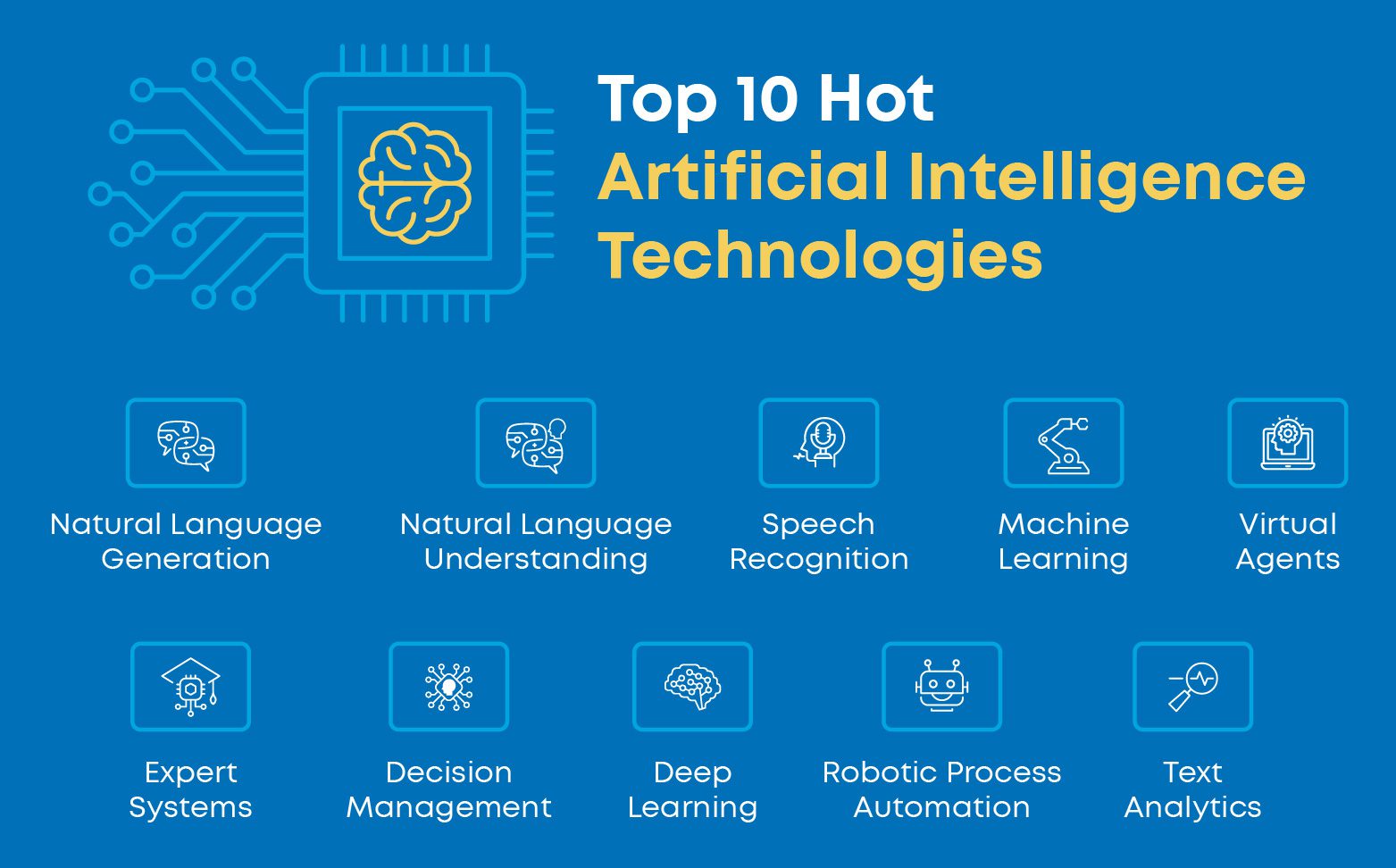Artificial intelligence (AI) technology is rapidly transforming various industries and revolutionizing the way we live and work. Natural language processing (NLP), facial recognition, predictive analytics, autonomous vehicles, robotics, virtual assistants, computer vision, natural language generation (NLG), predictive maintenance, and augmented reality (AR) are ten of the many AI technologies that are changing the game. With advanced NLP, machines can analyze and process language in a way that is previously only possible for humans. Facial recognition technology identifies a person by analyzing their facial features, and with the advent of deep learning, it has become more accurate, faster, and more reliable. Predictive analytics helps businesses make smarter decisions, and autonomous vehicles could reduce accidents and traffic congestion. Robotics, virtual assistants, computer vision, natural language generation, predictive maintenance, and augmented reality all provide benefits to various industries. As AI technology continues to advance, we can expect more exciting developments and innovations in the future.
1. Natural Language Processing
Natural language processing (NLP) is an AI technology that enables machines to interpret and understand human language. With advanced NLP, machines can analyze and process language in a way that was previously only possible for humans. This technology is already transforming the way we interact with machines and is used in a variety of applications like language translation, chatbots, voice assistants, and sentiment analysis.
2. Facial Recognition
Facial recognition technology can identify a person by analyzing their facial features. It is used in security systems, marketing campaigns, and even gaming. The technology has been around for a while, but with the advent of deep learning, facial recognition has become more accurate, faster, and more reliable. With its ability to quickly scan and recognize faces, facial recognition may soon become a critical part of our daily lives.
3. Predictive Analytics
Predictive analytics uses machine learning and other technologies to analyze past data and predict future trends. It can help businesses make smarter decisions, identify potential problems before they occur, and forecast future outcomes. From predicting customer behavior to analyzing financial data, predictive analytics is becoming an essential part of many industries.
4. Autonomous Vehicles
Autonomous vehicles, or self-driving cars, use AI and machine learning to navigate roads and safely transport passengers. This technology is already being tested and deployed by companies like Tesla and Uber, and has the potential to revolutionize transportation. With the ability to reduce accidents and traffic congestion, autonomous vehicles could transform the way we travel.
5. Robotics
Robotics is the combination of AI and automation to create machines that can perform tasks previously done by humans. From manufacturing to healthcare, robots are being used to streamline processes, increase efficiency, and improve safety. As AI technology advances, we can expect to see more complex and intelligent robots performing increasingly complex tasks.
6. Virtual Assistants
Virtual assistants, like Siri and Alexa, use NLP to interpret and respond to voice commands. They can answer questions, perform tasks, and even control smart home devices. Virtual assistants are becoming more sophisticated, with the ability to recognize natural language and context, and may soon become an indispensable part of our daily lives.
7. Computer Vision
Computer vision is an AI technology that enables machines to interpret and analyze images and videos. From object recognition to facial recognition, computer vision has a wide range of applications in fields like healthcare, security, and entertainment. With the ability to identify and analyze visual data, computer vision is poised to become a critical part of many industries.
8. Natural Language Generation
Natural language generation (NLG) is an AI technology that uses algorithms to generate human-like language. From writing news articles to creating personalized emails, NLG can help businesses automate content creation and improve communication with customers. With the ability to create natural-sounding language, NLG is an exciting and rapidly developing technology to watch.
9. Predictive Maintenance
Predictive maintenance uses machine learning to predict equipment failures before they occur, enabling businesses to perform maintenance and repairs proactively. With the ability to avoid costly downtime and prevent equipment damage, predictive maintenance is becoming an essential part of many industries, from manufacturing to healthcare.
10. Augmented Reality
Augmented reality (AR) is a technology that overlays digital information onto the physical world. With AR, users can see digital information like text, images, and videos overlaid onto their surroundings. From gaming to healthcare, AR has a wide range of applications and is rapidly advancing, with the potential to transform the way we interact with the world around us.
These are just ten of the many AI technologies that are changing the way we live and work. From improving safety to increasing efficiency, AI is transforming industries and shaping the future of technology. As AI technology continues to advance, we can expect to see even more exciting developments and innovations in the years to come.
